Donald Trump
When President Donald Trump and New York Mayor-elect Zohran Mamdani first met back in November, I had to laugh. Partially because there is something deeply absurd about these two men—Mamdani, a self-proclaimed Democratic Socialist, and Trump, who once proclaimed he wished to be a dictator for “one day”—smiling and posing for photos in the Oval Office. But I mainly found myself laughing because, despite the drastic differences between these two politicians, both have been critical to my own faith and political journey.
As the Apostle Paul warns us in 1 Timothy 6:9: “But those who want to be rich fall into temptation and are trapped by many senseless and harmful desires that plunge people into ruin and destruction.” And if you want proof of Paul’s words, look no further than the release of Jeffrey Epstein’s emails.

Let’s take a quick trip back to the fall of 2016. Justin Bieber, Drake, and Twenty-One Pilots are topping the charts. All the cool kids are bottle-flipping. And almost every adult I know is falling in line to vote for Donald Trump. I’m from the western side of Michigan, and my home county went to Trump by almost 30 percentage points.
I was just starting to develop political opinions at that time, but it shocked me how so many people—who I knew cared deeply about their own moral lives—could countenance voting for a candidate who made a mockery of Christian values like forgiveness and marital fidelity.
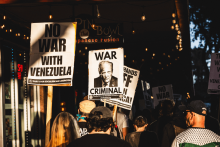
The Trump administration is blowing boats to pieces off the coast of Venezuela.
At different points this year, I’ve been left with the unsettling feeling that I don’t have the emotional bandwidth to fully process—let alone respond to—all of what’s happening. Early in the year, we all acknowledged that this overwhelmed feeling was by design, part of the Trump administration’s “flood-the-zone” strategy, intended to weaken and divide its opposition.
I’ve been wrestling with this in light of the attacks the Trump administration is orchestrating in Venezuela. On one hand, I’m perplexed at why such a costly, unlawful, and frankly evil operation isn’t garnering louder public outcry; on the other hand, I know there is so much else on people’s minds. It’s not that we don’t care about it all—from Chicago to Palestine to Sudan to so many other places where we know there’s urgent suffering—but there’s only so much outrage we can process before weariness takes over.
And yet I can’t ignore what’s happening in Venezuela
In Palestine, we welcomed the news of a ceasefire with hope—a fragile, trembling hope. After months of unbearable horror, we allowed ourselves to exhale. For the people of Gaza, it meant a pause in the killing, a night of uneasy quiet, and the possibility of sleep without bombs.

In the past week, the Trump administration brokered a deal that secured the release of Israeli hostages and Palestinian prisoners. While the terms of the long overdue ceasefire are being contested, this is a groundbreaking accomplishment for which I’m deeply thankful. But this short-term peacemaking victory abroad was quickly undermined by the administration’s bellicose rhetoric and actions at home.
President Donald Trump has repeatedly abused his ability to declare emergencies and seize power under the pretense of maintaining law and order. For example, he declared immigration emergencies to further militarize the U.S.-Mexico border and label drug cartels terrorists; he declared a “trade emergency” to justify and impose costly tariffs; and he declared an energy emergency to greenlight new drilling projects and ignore regulations. Most alarmingly, he has falsely declared a “crime” emergency to federalize and deploy National Guard troops to additional cities.

You may have heard that, at Charlie Kirk’s memorial service, Erika Kirk said that she forgave her husband’s assassin.
You may have also heard that only a few minutes later, President Donald Trump said that while Charlie Kirk “did not hate his opponents—he wanted the best for them,” he was different: “I hate my opponent, and I don’t want the best for them!” This moment got a lot of attention, understandably so, but another moment stuck out to me even more. And even though we’re almost a week and a half removed from the memorial service, I think it’s still worth exploring today.

“On Sunday, Erika Kirk forgave the man who shot her husband,” Jimmy Kimmel told his live studio audience on Tuesday night, his first show back after a six-day suspension following his musings on Charlie Kirk’s assassination. “She forgave him.”
“That is an example we should follow,” Kimmel continued, his voice cracking with emotion. “If you believe in the teachings of Jesus, as I do, there it was. That’s it. A selfless act of grace, forgiveness from a grieving widow that touched me deeply. And if there’s anything we can take from this tragedy, I hope it’s that.”

When the House passed President Donald Trump’s Big Beautiful Bill Act, House Speaker Mike Johnson gave glory to God.
Johnson, the Louisiana Republican and Christian, believes that his work and the work of the United States are divinely orchestrated. But if the so-called “Big Beautiful Bill” is truly from God, then what are we to make of cuts that negatively impact the most marginalized in our society?

On Tuesday, President Donald Trump climbed onto the roof of the White House briefing room, saying he was there “taking a little walk,” and surveying the “ballroom on the other side.”
Last week, the White House announced plans for a $200 million ballroom, with hopes for the golden, gilded East Wing to be completed by 2029.
Surprisingly, the Bible has a lot to say about rooftops. In the Hebrew Bible and New Testament, rooftops are a key part of stories where powerful rulers stand and hatch plans to exploit the vulnerable, where God intervenes to encourage inclusive polity, and even in the tempting of Jesus. At other times, the Bible instructs people on how to build their rooftop decks, and roofs are used to ask Jesus to care for others. Rooftop stories show God cares about good infrastructure, accessibility, and safe communities.

In 2022, Dua Lipa appeared as a guest on The Late Show with Stephen Colbert, and asked him about the role his faith plays in his work.
“Does your faith and your comedy ever overlap?” she asked. “And does one ever win out?”
Colbert first offers a little quip (“I think, ultimately, us all being mortal, the faith will win out in the end”) and then launches into a lengthy and eloquent treatise on how Catholic teaching has trained him to wield humor as a defense against despair.

If it’s not obvious: I genuinely enjoy celebrating July Fourth. Yet I know that many Americans — including Christians who share my commitment to social justice — have a far more complicated relationship with the holiday. And I get that reluctance. So often, celebrating Independence Day is wrapped in a weaponized, politicized form of patriotism which allows no room for critiquing the real harms and contradictions of our nation. But I think it’s a mistake for us to cede patriotism to those who turn it into a poisonous blend of nationalism and ethnocentrism, fixated on blood and soil and fueled by fear of “the other.”

We also need to be clear: Iran did not possess a nuclear weapon. Iran was enriching uranium needed for such a weapon and had recently increased its production, but intelligence assessments concluded they had not made a final decision to produce a bomb. In fact, the assessment said Iran would be more likely to produce a weapon if the U.S. attacked its uranium supply.
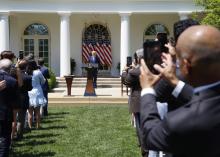
During the first White House National Day of Prayer of his second term, President Donald J. Trump said he is making America “rich, healthy, and religious again.”
Trump’s approval ratings have dropped sharply since he returned to the White House and stand at 42% after his first 100 days in office, according to a poll by NPR. Still, Trump claimed that the spirit of the country shifted positively since Nov. 5, the day he was elected. Trump said his administration was “bringing religion back” to the United States of America.
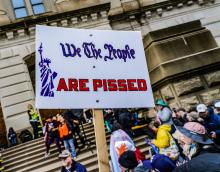
There’s been plenty of coverage of what Trump and his administration have done in their first 100 days. In the conservative media ecosystem, this coverage appears as disinformation-riddled praise for how Trump has restored America’s greatness and created renewed prosperity. In mainstream media outlets, this coverage is often focused on cataloguing the harms of policies that often felt chaotic or cruel. And while I’m grateful for those who ensure the public has an accurate understanding of the impact of Trump’s decisions, there’s another set of stories beneath those headlines that rarely get as much attention: how people have consistently been taking courageous action to counter these harms.
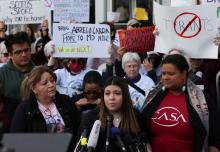
At some point this Easter Weekend, Christians will be reflecting on the final words that Jesus spoke from the cross, sometimes referred to as the seven last words of Jesus.
When I was younger, I was convinced that System of a Down’s “Chop Suey!” was a Christian song because lead vocalist and lyricist Serj Tankian incorporated Jesus’ final declarations into the song. But dissimilar to the order that Christians have typically arranged Jesus’ final words, the song first quotes the cry of reunion and then climaxes with the cry of dereliction.
Considering that the Roman Empire believed Jesus was a terrorist and crucified him as one, emphasizing the cry of dereliction seems apt.
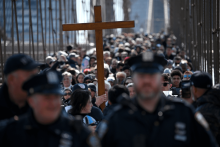
Reading these passages today, Jesus’ trial is a striking example of the interplay between the political power brokers who condemn Jesus to death and the crowds who cried out to Jesus days earlier for deliverance. While Pilate is responsible, he uses the crowd’s actions as cover, absolving himself of responsibility for deciding Jesus’ fate. Reading this story amid the deeply concerning judicial drama playing out in real time between the Trump administration and courts, I’m reminded of the role we all can play when we collectively act — or fail to act — in support of justice.

Bishop Mariann Budde got a lot of attention at President Donald Trump's inauguration when she called on him to be merciful to those he had attacked during his campaign. Now, she reflects on her word choice, why she believes “mercy” was the right word, and the tension of leading a church through a political minefield.

In these tumultuous moments, I’m tempted to worry about my own retirement savings — a threat that is especially acute for those nearing retirement. These are real fears. Yet, as Christians, we also must pay attention to those who will feel the most severe impacts of this economic malpractice. And the sad truth is that these reckless tariffs will be especially harmful for people who don’t even have a 401(k), let alone any way to seek redress for U.S. government policies likely to increase inflation and spark a recession.

A few months before he was arrested, Dietrich Bonhoeffer wrote an essay on Christian responsibility under authoritarianism. Reading it today is both eerily relevant and illuminating.